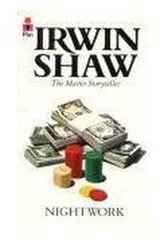Irwin Shaw - Short Stories - Five Decades
Здесь есть возможность читать онлайн «Irwin Shaw - Short Stories - Five Decades» весь текст электронной книги совершенно бесплатно (целиком полную версию без сокращений). В некоторых случаях можно слушать аудио, скачать через торрент в формате fb2 и присутствует краткое содержание. Год выпуска: 2013, Издательство: Open Road Media, Жанр: Современная проза, на английском языке. Описание произведения, (предисловие) а так же отзывы посетителей доступны на портале библиотеки ЛибКат.
- Название:Short Stories: Five Decades
- Автор:
- Издательство:Open Road Media
- Жанр:
- Год:2013
- ISBN:нет данных
- Рейтинг книги:5 / 5. Голосов: 1
-
Избранное:Добавить в избранное
- Отзывы:
-
Ваша оценка:
- 100
- 1
- 2
- 3
- 4
- 5
Short Stories: Five Decades: краткое содержание, описание и аннотация
Предлагаем к чтению аннотацию, описание, краткое содержание или предисловие (зависит от того, что написал сам автор книги «Short Stories: Five Decades»). Если вы не нашли необходимую информацию о книге — напишите в комментариях, мы постараемся отыскать её.
Short Stories: Five Decades — читать онлайн бесплатно полную книгу (весь текст) целиком
Ниже представлен текст книги, разбитый по страницам. Система сохранения места последней прочитанной страницы, позволяет с удобством читать онлайн бесплатно книгу «Short Stories: Five Decades», без необходимости каждый раз заново искать на чём Вы остановились. Поставьте закладку, и сможете в любой момент перейти на страницу, на которой закончили чтение.
Интервал:
Закладка:
Now the inconspicuous squat pumps that cap the wells of my company can be seen dotting the landscape from Manchester and Pawlet in the south to Burlington and Winooski in the north, nodding like steel hens pecking in a barnyard, bringing enough oil to the surface each day to give pause to any Arab potentate.
Wealth to the very rich becomes a toy, an adult version of building blocks, Erector sets and miniature electric trains, a diversion to fill the hours of the day, a game of one old cat for idle boys on a vacant lot. My own diversions are limited. I do not drink or smoke, I am bored by travel, repelled by art galleries, safaris, philanthropy and the competition for political office, the ordinary playthings of men who do not have to worry where their next dividend is coming from. Athletics, except for football, are of no interest to me, and I am well past the age when stopping a fullback at the line of scrimmage could be considered a possible form of amusement. I am happily married and would not stoop to running after women. But I am not built merely to sit back and watch money roll in. Since my wound, and conscious of my racial heritage, my pleasure has always been to demonstrate to the world that I am right and it is wrong and it remains so to this moment. In my heart, I knew that there were other Vermonts to conquer. One day, I was sure, in a random overheard phrase, a fragment of a dream, what I was searching for would be revealed to me.
Now to the wound to which I referred earlier.
In my last year at the university, I had an excellent season on the football field. I attracted national attention by gathering in a forward pass that had been tipped as it left the hand of the opposing quarterback and running with the ball for 70 yards for a touchdown. I was mentioned for all-American in several polls and almost automatically picked as the 14th draft choice by a National Football League team whose name I do not wish to divulge, as I have no desire to embarrass men who are still making a living from the game by holding them up to possible ridicule. In short, I reported to the team’s training camp along with over 100 other players, confidently prepared for a career of autumn Sundays full of glory and terror in the stadiums of the country. After one week, in which I knew that I had performed with honor and occasional spurts of brilliance and had clearly, I thought, outshone all the other candidates for the defensive-line positions, I, along with some 30 other aspirants, was cut from the squad and sent home and later—luckily, in my case—to the Harvard School of Business. Though things in the long run turned out well, I have never gotten over the damage to my self-esteem, which was compounded some years later when I met an assistant coach under other circumstances (he was looking for a job in one of my companies) and I questioned him about my summary dismissal. “Well, you know,” he said, “by league rules we can only finally carry forty-three men and we had to cut somewhere . When your name came up at the meeting, the coach said, ‘Isn’t he a gypsy? I have enough trouble as it is. What the hell do I need a gypsy for?’”
I gave the man the job he was looking for (he turned out to be absolutely incompetent and is still working for me at $43,000 a year, a figure whose significance I am sure he has never wondered at) and went back to old newspapers and game programs and studied the records of all the players who had been cut on the same day as myself and then the records of the players who had been cut in similar depletions from the other teams in the league. Almost invariably, I discovered that they had been stars in high school and college, had been the captains of their teams, had been cheered by hundreds of thousands of spectators, had trophy rooms lined with game footballs given to them by grateful teammates for outstanding performances, yards gained, tackles made, crucial blocks thrown. Surely, I thought, a team that could go all the way, to use the language of the sports page, could have been formed without the benefit of computers, reports and the cold-blooded estimates of dozens of assistant coaches from any 43 of the men who had desolately packed their bags and departed from their locker rooms on the same day as myself.
My new Vermont slowly began to take shape within my head.
At first, I thought of buying a franchise to test my theory. I found that it would not be difficult. My millions and the possession of a nationwide television network, it was intimated to me, would make me most welcome to join the fraternity of club owners. But after consideration, I decided that putting together a single team of 43 players chosen from one season’s culls would prove nothing or almost nothing. Even the most obstinate of the believers in the present system could admit that by the law of averages, a mere handful of deserving athletes had for one reason or another been passed over in the early days of practice sessions. Even if the team I chose went on to win the Super Bowl in its first year, I might be at best praised for my acumen as an architect of victory, which would leave matters more or less where they stood before and bring the bitter taste of ashes to my mouth. I did not wish to be congratulated for gypsy luck or gypsy guile—what I wanted was a gigantic demonstration that the entire system of choice in the modern world was founded on illusion and the frivolity and towering egos of theory-bound gurus and false messiahs in all theaters of endeavor. The reputation of the class of men who had dismissed me and scores of other players after one week on a hot practice field would have to be shattered and the mindless belief in their powers held by their countless followers dissolved into dust.
I would have to create not one team but a confederation of teams, a league of rejects who would play a full, scheduled season of games, under the pitiless eye of the television camera and in the full glare of publicity, to choose a winner among them that could then challenge, successfully, the victor in the pompously named Super Bowl.
In the middle of the summer, when the dejected athletes were beginning to stream back to their homes from the training camps, I had my staff prepare lists of positions, addresses, phone numbers. All this was done quietly, without fanfare. Equally quietly, I made the round of cities that had what I considered suitable or at least tolerable stadiums. The major cities were, of course, already taken, but if Tampa could support a major-league football team, what forbade Tallahassee, Toledo, Trenton from also enjoying the pleasures of first-class sport? Out of decent respect for luck, I included Montpelier, the capital of Vermont, among my choices. My guarantees were in cash, the advantages of my having a television network at my disposal were mentioned, old favors were invoked. When necessary, politicians were bribed. In every case, I signed firm contracts for five-year leases. Actually, no risk was involved. From the point of view of my complicated relations with the Internal Revenue Service, a loss of venture capital over that period would prove more profitable than not.
The same reckoning applied to the contracts I offered the players. As I had anticipated, almost every one of them responded eagerly to my explanatory telegrams. They felt, as I knew they would, as I had on that fateful day when I was turned away, that they had been denied their fair chance at fame and fortune and were ready to jump at this unexpected second opportunity to prove themselves. There was to be no bargaining for terms—each man was to be offered the same sum, $30,000 a year for two years, with a no-cut clause and a no-limit insurance policy in case of injury.
The selected players themselves, their names taken at random out of a hat, were to elect their own head coaches, assistant coaches, club managers and staff. I promised in no way to interfere with the running of any of the clubs after the offensive and defensive 11s, the special teams and the taxi squads had been picked by lot in my office and assigned, again by lot, to the various cities with which I had contracted.
Читать дальшеИнтервал:
Закладка:
Похожие книги на «Short Stories: Five Decades»
Представляем Вашему вниманию похожие книги на «Short Stories: Five Decades» списком для выбора. Мы отобрали схожую по названию и смыслу литературу в надежде предоставить читателям больше вариантов отыскать новые, интересные, ещё непрочитанные произведения.
Обсуждение, отзывы о книге «Short Stories: Five Decades» и просто собственные мнения читателей. Оставьте ваши комментарии, напишите, что Вы думаете о произведении, его смысле или главных героях. Укажите что конкретно понравилось, а что нет, и почему Вы так считаете.











